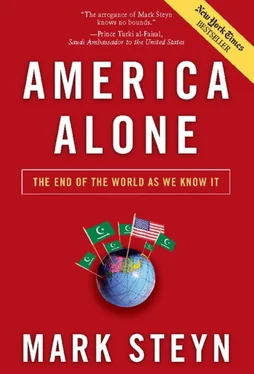In all probability billions of people are going to die in the next few decades. Our poor, abused planet cannot take much more…. If we take the unselfish route and try to save everyone the outcome is likely to be horrific conflict in the fight over resources, and continuing devastation of the planet until most, or all, of humanity is dead.
If we decide to put the planet first, then we ourselves are the pathogen. So we should let as many people die as possible, so that other species may live, and accept the destruction of civilization and of everything we have achieved. Finally, we might decide that civilization itself is worth preserving. In that case we have to work out what to save and which people would be needed in a drastically reduced population-weighing the value of scientists and musicians against that of politicians, for example.
Hmm. On the one hand, Dr. Sue Blackmore and the bloke from Coldplay. On the other, Dick Cheney. I think we can all agree which people would be “needed” — Al Gore, the board of the Sierra Club, perhaps Scarlett Johansson in a fur-trimmed bikini paddling a dugout canoe through a waterlogged Manhattan foraging for floating curly endives from once fashionable eateries.
Curiously, those environmentalists calling for a dramatically smaller population never seem to lead by example, and always manage to give the impression that no matter how small the ark is they’re a shoo-in for a first-class stateroom. But, as it happens, Dr. Blackmore won’t have to worry about whether to sacrifice Jacques Chirac and Vladimir Putin in order to save Sting and Bono. Given the plummeting birth rates in Europe, Russia, Japan, etc., a large chunk of the world has evidently decided to take pre-emptive action on climate change and opt for societal suicide. The crisis we face today is the precise opposite of “overpopulation”: the developed world’s population is shrinking faster than any human society not in the grip of war or disease has ever shrunk. Does the environmental movement sicken itself only over the black rhino and the green-cheeked parrot? Aren’t people part of the environment? They certainly have environmental implications. For one thing, there’ll be far fewer environmentalists around. By the end of this century, the demographically doomed Italians and Spaniards will be so few in number there won’t be enough Continental environmentalists left to man the local Greenpeace office. The Belgian climate-change lobbyist will be on the endangered species list with the Himalayan snow leopard. And, from an American point of view, the blue-state ecochondriacs of Massachusetts and California will be finding the international sustainable development conferences a lot lonelier. As for the merits of scientists and artists over politicians, those parts of the world still breeding are notable for their antipathy to music, haven’t done much in the way of science for over a millennium, and politics-wise incline mostly to dictators and mullahs, nuclear or otherwise. Scrap Scarlett Johansson’s fur-trimmed bikini and stick her in a waterlogged burqa.
Most twenty-year projections (on economic growth, global warming, etc.) are laughably speculative, and thus most doomsday scenarios are too. The eco-doom-mongers get it wrong because they fail to take into account human inventiveness: We can’t feed the world! they shriek. But we develop more efficient farming methods with nary a thought. The oil will run out by the year 2000! they warn. But we develop new extraction methods and find we’ve got enough oil for as long as we’ll need it.
But human inventiveness depends on humans — and that’s the one thing we really are running short of, at least in the self-flagellating developed world.
THE WEST RUNS OUT OF STOCK
Take an alphabetical list of nations of the world and start at the beginning:
1. Afghanistan. In 2005, the rate of births per 1,000 people in the country was 47.02.
2. Albania. In 2005, the rate of births per 1,000 people in the country was 15.08.
That means Albanians are breeding at a third of the rate of Afghans. As noted above, “replacement” fertility rate — i.e., the number you need for merely a stable population, not getting any bigger, not getting any smaller — is 2.1 babies per woman. Some countries are well above that: the global fertility leader, Niger, is 7.46; Mali, 7.42; Somalia, 6.76; Afghanistan, 6.69; Yemen, 6.58. Notice what those nations have in common? Starts with an I, ends with a slam. As in: slam dunk.
Go back to that Albanian fertility rate. It looks low compared to Afghanistan but it’s the highest in Europe. And why would that be? Because it’s Europe’s only majority Muslim country. At the moment.
Scroll way down to the bottom of the Hot One Hundred top breeders and you’ll eventually find the United States, hovering just at replacement rate with 2.11 births per woman. New Zealand’s just below; Ireland’s at 1.9; Australia, 1.7. But Canada’s fertility rate is down to 1.5, well below replacement rate; Germany and Austria are at 1.3, the brink of the death spiral; Russia and Italy are at 1.2; Spain, 1.1 — about half replacement rate. So Spain’s population is halving with every generation. Two grown-ups have a total of one baby. So there are half as many children as parents. And a quarter as many grandchildren as grandparents. And an eighth as many great-grandchildren as great-grandparents. And after that there’s no point extrapolating, because you’re over the falls and it’s too late to start paddling back. I received a flurry of letters from furious Spaniards when the government decided to replace the words “father” and “mother” on its birth certificates with the less orientationally offensive terms “Progenitor A” and “Progenitor B.” This was part of the bureaucratic spring-cleaning of traditional language that always accompanies the arrival in law of “gay marriage.” But with historically low numbers of progeny, the designations of the respective progenitors seem of marginal concern. No point renaming the teams if you no longer play the game. They might at least encourage young Spaniards to wander into the Barcelona singles bars and try out the line: “Do you want to come back to my pad and play Progenitor A and Progenitor B?” “Well, okay, but only if I can be Progenitor A…” Just as revealing, in 2006 Spain’s ruling Socialist Party introduced a bill in parliament legislating that apes be included in “the category of persons, and that they be given the moral and legal protection that currently are only enjoyed by human beings.” The party’s argument was that human Spaniards do, after all, share 98.4 percent of their genes with chimpanzees, 97.7 percent with gorillas, and 96.4 percent with orangutans. Unfortunately, the 2 percent Spaniards don’t share apparently includes the urge to reproduce. For the new Europe, instead of Gibbon’s Decline and Fall, maybe someone should write Gibbons’ Rise and Triumph. But why stop there? Why not give sheep the right to an abortion? Or allow gerbils to contract gay marriage? With a cockatoo? Why does the king of Spain not simply declare that henceforth, by royal proclamation, pigs shall fly?
By 2050, Italy’s population will have fallen by 22 percent, Bulgaria’s by 36 percent, Estonia’s by 52 percent — or more. Seventeen European nations are now at what demographers call “lowest-low” fertility: 1.3 births per woman. In theory, those countries will find their population halving every thirty-five years or so. In practice, it will be quicker than that, as the savvier youngsters figure there’s no point sticking around a country that’s turned into an undertaker’s waiting room. Not every pimply burger flipper wants to support entire old folks’ homes single-handed and, aside from the economic argument, there are cultural factors too: I love going into Viennese record stores where the main floor’s full of waltzes and operetta, and the hip-hop section’s one tiny bin down in the back of the basement. But if you’re young and fancy a burg with more of a buzz on the cutting edge of the zeitgeist you’re unlikely to find it in Western Europe circa 2020. As for America, demographic trends suggest that the blue states ought to apply for honorary membership of the EU; in the 2004 election, the Bush-voting states had fertility rates 12 percent higher than Kerry-voting states. Barring a sudden change in electoral fortunes, Democrats are going to be even more depressed after the 2010 and 2020 reapportionments.
Читать дальше












